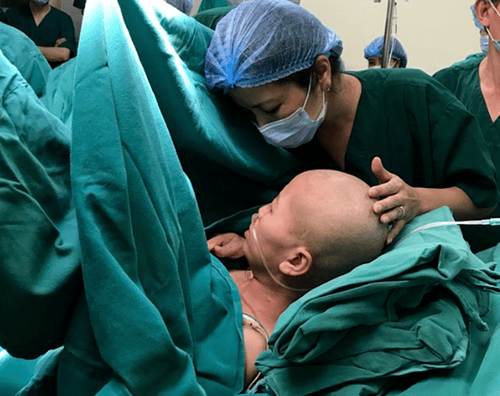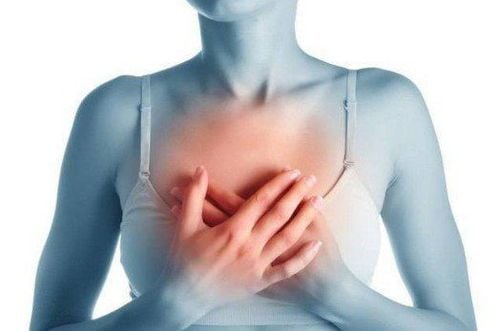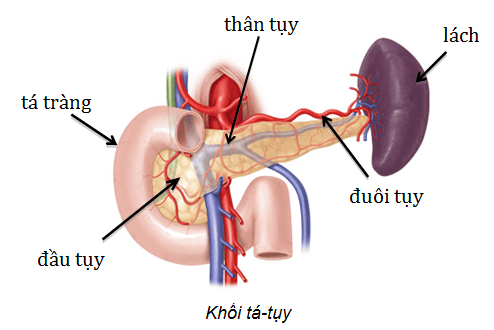This is an automatically translated article.
End stage breast cancer is considered the most difficult time for patients. These manifestations of cancer have spread to many different areas of the body and require the most aggressive treatment.The article was professionally consulted by BSCK II Phung Thi Phuong Chi - Oncologist - Oncology Center - Vinmec Central Park International General Hospital. The doctor has 20 years of experience in the field of oncology.
1. End stage breast cancer
Breast cancer usually goes through four stages. In particular, breast cancer, or stage 4, is when the cancer has spread beyond the original site. Often, in the late stages of breast cancer, the malignant cancer cells have spread to many other organs, such as the lymph nodes, brain, liver, lungs, and bones. Therefore, people also call this stage breast cancer with the name "metastatic breast cancer". Once metastatic breast cancer is considered incurable, there are many treatments available that can prolong life and make patients more comfortable.Recently, Ms. Nguyen Thi L (28 years old) 31 weeks pregnant, had to have a cesarean section on the afternoon of May 22 because the prognosis is getting worse when she has terminal breast cancer.
Before that, Ms. L discovered that there was a lump in the breast when the fetus was 8 weeks old, thinking it was a sign of a common breast disease, so she did not go to the hospital for examination. When there were signs of a lot of coughing, the body became tired, the chest tightness was worse, the lymph nodes appeared in the shoulders, the legs were swollen, the whole body ached. Only then did Ms. L go to K Hospital for examination to find out that it was a symptom. end stage breast cancer. At this time, the baby in the womb is almost 4 months old. Even though she was devastated, she still decided to keep the baby.
When the baby was born, the baby cried very loudly, due to the premature birth, the body was still weak, and must be taken care of immediately afterwards.

Bệnh nhân ung thư vú giai đoạn cuối Nguyễn Thị L sinh con (Ảnh: Nguyễn Khánh - báo Tuổi Trẻ)
2. Late stage breast cancer symptoms
2.1. Tumors in the breast In the early stages of breast cancer, the lumps are often too small for the patient to see or feel on their own. That's why doctors often recommend mammograms and other screenings to potentially detect early signs of changes that lead to breast cancer.But for advanced breast cancer, most women can clearly see or feel lumps in their breasts. The patient may also feel swelling around the breast or armpit area. In rare cases, patients come to the doctor because of signs of metastasis to other organs without symptoms of a tumor in the breast.
2.2. Skin changes Some types of late-stage breast cancer have the potential to lead to skin changes, such as “Paget breast disease”. Accordingly, the patient's skin may itch or crack, develop a red rash, or become thickened. Some patients develop dry, flaky skin. Inflammatory breast cancer can also lead to changes in the skin. Cancer cells clog lymph vessels, causing redness, swelling, and pitting in the skin. Any type of stage 4 breast cancer can lead to similar skin symptoms.
2.3. Nipple discharge Not only in the final stages, nipple discharge symptoms can appear at any stage of breast cancer. The patient notices an unusual discharge from the nipple, which may be yellow and look like pus, or even blood.
2.4. Breast pain Breast pain is one of the late stage breast cancer symptoms. Patients will feel discomfort and pain as cancer cells grow inside the breast. This is often accompanied by swelling, redness, or skin sores. A large tumor also causes pain and pressure.
2.5. Fatigue Fatigue, although atypical, is the most common symptom in patients with metastatic breast cancer. This manifestation will affect almost all patients during and after treatment. In stage 4, fatigue becomes more frequent and causes a lot of discomfort for the patient.

Mệt mỏi là triệu chứng không điểm hình nhưng rất hay gặp ở bệnh nhân ung thư vú giai đoạn cuối
2.7. Shortness of breath Shortness of breath is a symptom that occurs when breast cancer is at an advanced stage. The patient has chest tightness, feels like he can't take a deep breath, and has difficulty in breathing. Sometimes, this condition is likely due to cancer that has spread to the lungs. In addition, radiation and chemotherapy can also cause respiratory symptoms, including persistent or dry cough.
2.8. Pain in the bone Persistent pain in the bone or pathological fracture (fracture without a traumatic cause) is a common sign of breast cancer with bone metastases. Sometimes bone metastases are asymptomatic until the doctor detects the patient's skeletal system by means of imaging.
Breast cancer is a very dangerous disease and can happen to anyone. For advanced breast cancer, the germ of the disease has spread to many other organs and causes severe complications. Therefore, Vinmec International General Hospital deploys a breast cancer screening package to help customers proactively screen the disease at the earliest when the above signs are present for timely treatment.
Please dial HOTLINE for more information or register for an appointment HERE. Download MyVinmec app to make appointments faster and to manage your bookings easily.













